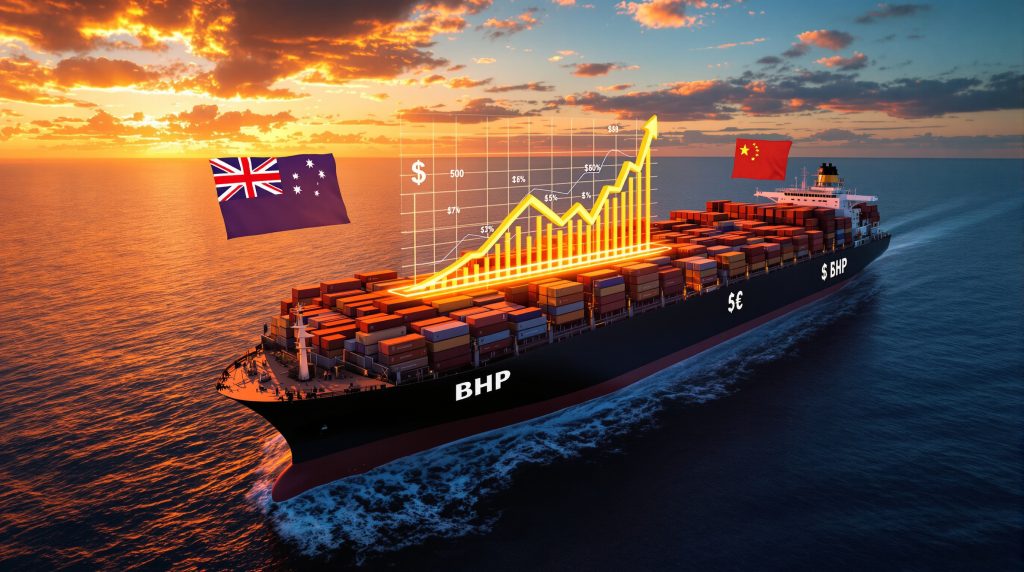Australia-China Iron Ore Negotiations: Understanding the Current Standoff
The Australian mining sector is closely watching developments in the ongoing iron ore price trends between BHP and China Mineral Resources Group (CMRG). Recent reports indicate that CMRG has temporarily halted purchases of BHP's iron ore shipments as negotiations over pricing terms have reached an impasse. This development has prompted responses from Australia's highest political offices, including Prime Minister Anthony Albanese who expressed hope for a quick resolution to the iron ore negotiations.
According to Bloomberg Television, the reported pause affects primarily dollar-denominated cargoes, with sources indicating that even shipments already en route from Australia cannot be finalized under current conditions. Only yuan-denominated cargoes that have already arrived in China remain available for purchase, creating a significant disruption to normal trade flows.
Current Status of the Negotiations
Multiple meetings between CMRG and BHP officials have reportedly failed to produce a mutually agreeable deal on pricing terms, leading to the current standoff. The pause specifically targets BHP shipments, while negotiations with other Australian suppliers continue.
Prime Minister Albanese characterized the situation as "disappointing" but potentially temporary, noting that such interruptions can occur during price negotiations. His public comments suggest government monitoring of the situation without direct intervention at this stage.
Why Are These Negotiations Important for Australia?
Iron ore represents Australia's most valuable export commodity, with projections indicating it will be worth approximately $116 billion in 2024-25. The significance of these negotiations extends beyond BHP to potentially impact Australia's broader economic outlook and trade war impact with China.
Australia's position as the world's largest producer of iron ore makes these negotiations particularly consequential for national export revenues. The country's mining sector relies heavily on stable demand from Chinese steel producers, who remain the primary consumers of Australian iron ore.
Economic Significance of Iron Ore Exports
The iron ore trade relationship between Australia and China demonstrates deep economic interdependence:
- Iron ore accounts for over 20% of Australia's total exports
- Australia exported approximately $71.8 billion of iron ore to China in 2023
- China remains the primary destination for Australian iron ore shipments
- Resource exports challenges are crucial for Australia's economic planning
Table: Australia's Iron Ore Export Value (Recent Years)
| Year | Export Value to China | Percentage of Total Exports |
|---|---|---|
| 2023 | $71.8 billion | >20% |
| 2024-25 (projected) | Part of $116 billion total | >20% |
How Has the Australian Government Responded?
The Australian government's approach has been measured, focusing on facilitating commercial resolution rather than escalating the situation to a diplomatic matter. This reflects the government's understanding of the commercial nature of the negotiations.
Prime Minister's Position
Prime Minister Anthony Albanese has characterized the situation as concerning but potentially temporary, framing it as part of the normal negotiation process rather than a permanent trade disruption:
"These measures are always disappointing. Let's hope, certainly, that they are very much short-term," the Prime Minister stated in comments to media outlets. "Sometimes when people are negotiating over price, sometimes these things will occur. I want to see this resolved quickly."
Albanese further emphasized the mutual benefits of the trade relationship, noting: "I want to see Australian iron ore to be able to be exported to China without hindrance. That is important; it makes a major contribution to China's economy but also to Australia's."
Government Monitoring and Intervention
The Australian government is actively monitoring the situation, with:
- Treasurer Jim Chalmers reportedly arranging discussions with BHP's leadership
- Diplomatic channels remaining open to facilitate resolution
- Government officials characterizing the dispute as primarily commercial rather than political
- Regular communication with industry stakeholders to assess impacts
What Is China Mineral Resources Group?
CMRG is China's state-run buyer for iron ore, established with the strategic goal of consolidating purchasing power for the Chinese steel industry. The organization represents a significant evolution in China's approach to securing critical raw materials for its manufacturing sector.
Strategic Role in China's Iron Ore Purchasing
CMRG represents a strategic consolidation of China's iron ore buying power, established to:
- Coordinate purchasing for China's steel industry
- Strengthen negotiating leverage with major suppliers
- Potentially influence global iron ore pricing mechanisms
- Secure stable supply chains for China's industrial development
The organization's approach to negotiations with BHP provides insight into China's broader strategy for managing relationships with key resource suppliers. The current impasse suggests CMRG is exercising its consolidated negotiating power to pursue more favorable price forecast analysis.
What Are the Potential Market Implications?
The current situation creates uncertainty in iron ore markets, though the fundamentals of supply and demand remain relatively stable. Both parties have strong economic incentives to reach an agreement, suggesting the disruption may be temporary rather than structural.
Short-Term Market Adjustments
Market analysts suggest several potential scenarios for how this situation might unfold:
-
Temporary supply reallocation: China may increase purchases from other major suppliers like Rio Tinto, Fortescue, or Brazil's Vale to offset the BHP pause
-
Price volatility: Short-term iron ore price fluctuations may occur as markets adjust to the disruption
-
Negotiation breakthrough: Increased pressure could accelerate a resolution as both parties have economic incentives to maintain trade flows
-
Partial resumption: Negotiations might result in staged resumption of shipments under revised terms
Long-Term Relationship Considerations
The current standoff occurs within a broader context of Australia-China trade relations that have experienced both challenges and improvements in recent years. Both nations have strong economic incentives to maintain functional trade relationships, particularly in critical resource sectors.
Industry observers note that the iron ore relationship has remained relatively stable even during periods of diplomatic tension, highlighting its importance to both economies.
How Might This Affect Other Australian Mining Companies?
While the current pause specifically targets BHP shipments, the situation raises questions about potential implications for other Australian iron ore exporters and the broader mining sector.
Potential Industry-Wide Impacts
The outcome of these negotiations could establish precedents that influence future pricing discussions across the industry:
-
Precedent setting: The outcome of BHP's negotiations could influence future pricing discussions with other suppliers
-
Market share shifts: Temporary redistribution of purchases could benefit other Australian exporters in the short term
-
Industry alignment: How the Australian mining sector collectively responds could influence future negotiating dynamics
-
Investment considerations: Prolonged uncertainty could affect investment decisions for capacity expansion projects
Major Australian iron ore producers like Rio Tinto and Fortescue Metals Group are likely monitoring developments closely, as the terms achieved by BHP could influence their future iron ore demand insights.
What's Next in the Negotiations?
Resolution pathways exist that could address the concerns of both parties, though the timeline remains uncertain. The economic interdependence between Australian suppliers and Chinese buyers creates strong incentives for finding mutually acceptable terms.
Pathways to Resolution
Several factors will likely influence how quickly this situation resolves:
-
Economic imperatives: Both parties have strong financial incentives to reach agreement
-
Market alternatives: China's ability to source sufficient iron ore from alternative suppliers is limited long-term
-
Diplomatic engagement: Government-to-government discussions may help facilitate commercial resolution
-
Price trend influences: Broader iron ore market conditions will shape the negotiating environment
Industry analysts suggest that pricing mechanism discussions, rather than absolute price points, may be central to the current negotiations. The potential introduction of new reference pricing or contract structures could emerge as part of a resolution.
FAQ: Australia-China Iron Ore Trade Relations
How important is China to Australia's iron ore industry?
China remains Australia's largest iron ore customer, purchasing approximately $71.8 billion of Australian iron ore in 2023. The trade relationship is mutually beneficial, with China's steel industry relying heavily on Australian supply and Australia's mining sector depending on Chinese demand.
The scale of this interdependence makes a long-term disruption costly for both parties, creating strong economic incentives for resolution.
Could this dispute escalate into broader trade tensions?
While concerns about escalation exist, both Australian government officials and market analysts characterize the current situation as primarily a commercial negotiation rather than a political dispute. The economic interdependence between the two countries in the iron ore sector creates strong incentives for resolution.
Recent history suggests that iron ore trade has remained relatively insulated from broader diplomatic tensions due to its economic importance to both nations.
How might this affect iron ore prices globally?
Short-term price volatility is possible as markets adjust to any supply disruptions. However, the fundamental supply-demand balance in the iron ore market remains relatively stable, which should limit extreme price movements unless the dispute becomes prolonged.
Market analysts note that price impacts would depend on the duration of the pause and whether it expands to include other Australian suppliers.
Are other Australian exports to China at risk?
Currently, there are no indications that the iron ore negotiation standoff will spread to other export categories. Both countries have worked to stabilize trade relations in recent periods after earlier tensions.
The targeted nature of the current pause, focusing specifically on BHP shipments rather than all Australian iron ore, suggests this is a discrete commercial matter rather than a broader trade policy shift.
Further Exploration
Readers interested in learning more about Australia's iron ore industry and trade relations with China can also explore related educational content from Australian Mining, which offers regular updates on developments in the mining sector.
The evolving dynamics of resource trade between Australia and China represent an important aspect of the Indo-Pacific economic landscape, with implications for regional trade patterns, resource security, and economic development strategies.
Want to Spot the Next Major ASX Discovery?
Discover significant ASX mineral discoveries before the market with Discovery Alert's proprietary Discovery IQ model, providing instant, actionable trade alerts on high-potential opportunities. Explore how historic discoveries have delivered substantial returns by visiting the Discovery Alert discoveries page and position yourself for success.




